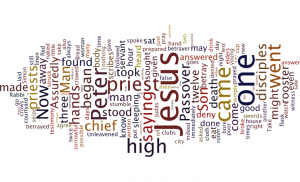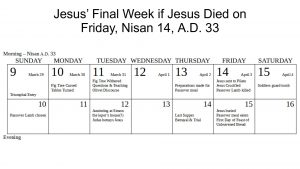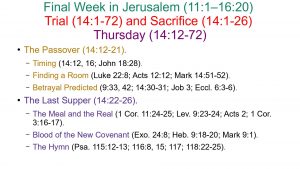Jesus’ Final Week in Jerusalem
Mark 11:1–16:20
Teaching (11:1–13:37)
King (11:1-11)
Sunday: Triumphal Entry (11:1-11).
Lawgiver (11:12–12:44)
Monday (11:12-19).
Tuesday (11:20–14:2).
Prophet (13:1-37)
Trial (14:1-72)
Sacrifice (14:1-26)
Thursday (14:12-72)
The Passover (14:12-21).
Timing (14:12).
As you read this (14:12, 16), it certainly sounds like this is the Passover feast.
This would make it the 14th of Nisan, which ruins the timeline I established earlier.
John indicates that the Passover was the day that Jesus was crucified (John 18:28), so how can we reconcile this?
The wording here in 14:12 in Greek is nebulous enough that it could be understood to mean that they were preparing a room in anticipation of the Passover that was quickly arriving.
 And this makes sense. After all, you would need time to prepare the Passover meal, and what if you couldn’t find somewhere to eat it right away? I mean, every Jewish male was supposed to be in Jerusalem for this feast—they were staying in Bethany, remember. It might be difficult to find a room, so plan ahead.
And this makes sense. After all, you would need time to prepare the Passover meal, and what if you couldn’t find somewhere to eat it right away? I mean, every Jewish male was supposed to be in Jerusalem for this feast—they were staying in Bethany, remember. It might be difficult to find a room, so plan ahead.But Jesus already had a plan.
Finding a room (14:13-16).
Jesus sends out two of His disciples, likely from their lodge in Bethany. Luke informs us they are Peter and John (Luke 22:8).
They are to find a site that was rather unusual for that time: a man carrying a pitcher of water. Usually you would find a woman doing this, so this would get their attention.
They were to follow this man and ask the head of the house that he walked into for a room to eat the Passover.
As with the colt in Mark 11, it’s hard to say whether or not this was planned beforehand, or something that was divinely prepared.
It seems that, since the disciples didn’t know about it, and had to go about finding this man by such unusual means, that it was a miraculous occurrence.
There is some speculation as to whose house this is. Some scholars believe it could be the house of John Mark himself.
The man with the pitcher of water could be Mark’s father or perhaps a servant of his family.
This house is described in Acts 12:12 as being in Jerusalem, and large enough to house many disciples.
Later it was known as “a center for Christian fellowship in Jerusalem” (Wiersbe 159; Jones 151).
Whether or not this was Mark’s house, I can’t say, but there is no better speculation that I’ve heard—plus it might explain some random occurrence mentioned later in this chapter (14:51-52).
Peter and John go to Jerusalem and find it just as Jesus described it!
They gather what’s needed to prepare for the Passover meal, possibly for the following evening.
 Betrayal predicted (14:17-21).
Betrayal predicted (14:17-21).Evening had come, meaning the next day was upon them, and Jesus with the remaining disciples come from Bethany to the room in Jerusalem.
They were eating their supper, which may or may not have been the actual Passover meal.
Perhaps Jesus knew He wouldn’t have been able to actually partake of it with them, so this meal was prepared the night before.
I will grant, the natural reading suggests this was the Passover meal, as it does in Matthew and Luke. But John is a little more explicit, so we go with that timeline, that this is the evening meal on the 14th of Nisan.
The Jesus makes another bombshell prediction: “One of you … will betray Me.”
This literally means that one of them will deliver Him up, something that He had talked about before in His earlier predictions of His death (9:33).
The disciples are shocked and saddened, all but one, as they all ask, “Is it I?”
The question is one that hopes for and anticipates a negative response: “Surely not I!”
As one commentator put it: “They had often ‘debated over which of them was the greatest, but now they were discussing which of them was the vilest’” (Wiersbe 160; Jones 151).
They had grown accustomed to Jesus’ predictions coming true, particularly with the colt and with finding the room they were eating in.
They might not have always believed or understood what His predictions meant, like those of His death and resurrection or the Olivet Discourse, but they truly believed in Him now.
Of course later, Jesus would predict Peter’s denial, and Peter would deny that such a denial would take place—as if a betrayal were more believable than a denial (14:30-31).
Jesus says it’s one who dips with Him in the dish, literally a deep dish or a bowl.
Since they all likely did, the traitor was still unknown to them.
Jesus mentions it here because such an act was one of deep friendship which makes the betrayal that much worse.
What will happen to Jesus is the will of God, “as it is written of Him.”
But that doesn’t mean Jesus is unfeeling toward the one who would take the fall.
He is saddened that Judas would fall so far, even saying it would have been better had he never been born.
This is a common idea in parts of Scripture, that when one suffers so much, it is better that one had never existed to suffer through this (e.g. Job 3; Eccl. 6:3-6), as in the pits of hell (cf. Mark 9:42).
While this is the will of God, Judas is still completely and totally responsible for his own actions, and he would pay for them.
He was so close to Jesus, and yet so far away! Sad indeed!
The Last Supper (14:22-26).
The meal and the real.
This is a very common and familiar passage, or ones like it in Matthew, Luke, or 1 Corinthians, that we read when we take the Lord’s Supper each week.
At this supper that previews the Passover meal, He takes the bread, passed it along to His disciples, and tells them to eat it.
“This is My body,” He says, which doesn’t necessarily indicate it’s literally His body.
In a moment He takes the cup, passes it around, and tells them, “This is My blood.”
Jesus often compares Himself to other objects in order to teach about Himself.
The parables are a prime example of all of that.
In fact, in 1 Cor. 11:24-25 informs us this is to be done in remembrance of the Lord.
So, it is a memorial feast of what He has done for us, not meant to be taken as a literal event.
Couple this with the fact that His body and blood were right there sitting next to them when this was happening, and it shows that certain denominational doctrines on this issue are not what the Bible teaches.
But I do think the Lord is present with us in some way when we worship, even if it is not in the elements of the Lord’s Supper.
We covered that concept in the lessons we had on Leviticus (9:23-24) in particular, and references made the Spirit coming down in Acts 2 and that fact that the Spirit of God dwells with us in 1 Cor. 3:16-17.
What form that takes these days, I don’t know, but He’s here whether we think we feel it or not.
Blood of the New Covenant.
This is an interesting phrase that informs us of the nature of the new covenant or testament.
Jesus is no doubt alluding to the inauguration of the Mosaic Law in Exo. 24:8.
As the writer of Hebrews states about this: (Heb. 9:18-20).
Therefore not even the first covenant was dedicated without blood. For when Moses had spoken every precept to all the people according to the law, he took the blood of calves and goats, with water, scarlet wool, and hyssop, and sprinkled both the book itself and all the people, saying, “This is the blood of the covenant which God has commanded you.”
What we have here in this cup is a representation of the blood of the new covenant which God has commanded us, shed for many—available to all who will obey the gospel.
The Hebrews writer goes on to say these were shadows and copies of the true, the true blood of Christ that inaugurated the new covenant.
Jesus tells us He will not drink from this cup, which He calls here the fruit of the vine, until the kingdom of God comes.
And indeed, since He is present with us in spirit when we partake at His table, and since we are in that kingdom now (9:1), He drinks it with us new every Lord’s Day!
What believer wouldn’t want to experience that or be a part of that every single week?
The hymn.
Then Jesus and His disciples sing a hymn together.
I really wish I knew what that hymn was and how poignant it must be for the events that have occurred and what was about to occur.
Perhaps it was Psalm 16 or Psalm 22, psalms quoted later while Jesus was on the cross or while Peter was preaching about His resurrection.
What’s traditionally sung around Passover are Psalms 113–118.
After the Passover meal, they would sing Psalms 115–118.
We clearly don’t have time to read them all, but I would like to share with you a few relevant excerpts.
Psalm 115:12-13.
Psalm 116:8, 15.
Psalm 117:1-2.
Psalm 118:22-25.
In each of these Psalms, we can apply them to the Lord’s situation here and have some insight into what He might be thinking now.
If these songs can encourage the Lord, they surely can encourage us.
It is evident later in His prayer recorded in the Garden of Gethsemane that He was struggling—what hope these psalms might have provided!
Then Jesus returns with His disciples to the Mount of Olives to offer some last minute thoughts and teachings, and to pray.


